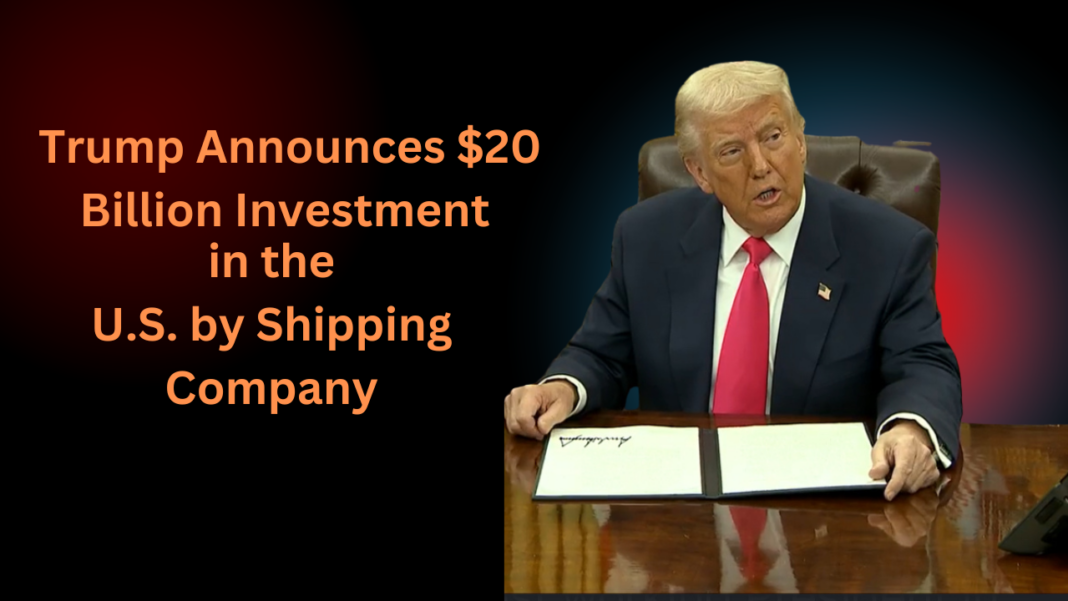President Donald Trump has announced a landmark $20 billion investment in the United States by CMA CGM, a French-based global shipping company, as part of efforts to boost domestic shipping, infrastructure, and job creation.
Speaking at the White House, President Trump hailed the deal as a “historic step toward restoring America’s dominance in global shipping and logistics.” He emphasized that the investment would create 10,000 new jobs in the country and strengthen U.S. supply chain resilience.
Expanding U.S. Shipping and Logistics
Under the agreement, CMA CGM will upgrade and expand container terminals across key U.S. ports, enhancing cargo handling capacity and logistics efficiency. Additionally, the company plans to establish a major air cargo hub in Chicago, with five newly acquired Boeing 777 freighters to be operated by American pilots.
In another key component of the investment, CMA CGM has committed to expanding its fleet of U.S.-flagged vessels from 10 to 30. However, this expansion depends on the capacity of American shipyards to build and service the ships, aligning with the administration’s broader push for a revitalized domestic shipbuilding industry.
“We are bringing back shipbuilding to America,” President Trump said. “For far too long, we’ve relied on foreign-built vessels. That ends now.”
Reviving American Shipbuilding
The White House has also confirmed plans for an executive order aimed at strengthening U.S. shipbuilding. This initiative could introduce tax incentives, grants, and low-interest loans to encourage domestic ship production.
A proposal under discussion includes fees on imports arriving on Chinese-built ships, with the goal of reducing reliance on Beijing for maritime trade infrastructure. Additionally, a new Maritime Security Trust Fund is being explored to support U.S. shipbuilders and expand the American-flagged commercial fleet.
Strategic Moves in the Panama Canal
Alongside the CMA CGM investment, U.S. financial giants BlackRock and Goldman Sachs have agreed to a $19 billion acquisition of the Balboa and Cristobal ports at either end of the Panama Canal. The ports, previously controlled by Hong Kong-based CK Hutchinson Holdings, are considered critical to global trade routes.
“This deal ensures that key maritime infrastructure serving the United States is in friendly hands,” a senior White House official said. “It’s about securing our supply chains and countering undue foreign influence.”
Economic and Political Implications
The CMA CGM investment and related initiatives signal a significant shift in U.S. maritime policy, aligning with President Trump’s “America First” economic strategy. The administration aims to strengthen American manufacturing, enhance logistical efficiency, and reduce dependence on foreign-built vessels, especially from China.
“This is a game-changer for American workers,” said U.S. Transportation Secretary Elaine Chao. “We’re bringing jobs, industry, and security back to America’s shores.”
Industry experts see the move as part of a broader effort to counter China’s dominance in global shipping. With the expansion of U.S.-flagged vessels and increased domestic shipbuilding, the administration hopes to bolster national security, trade competitiveness, and economic growth in a rapidly shifting global market.
As President Trump campaigns for re-election, this major economic boost is expected to play a pivotal role in shaping his platform on infrastructure, trade, and job creation. The success of these initiatives will depend on swift legislative support and private sector collaboration to ensure their long-term impact.
A global media for the latest news, entertainment, music fashion, and more.





